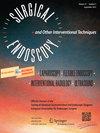摘要
背景:由于 "肩部 "胰腺癌非常靠近腹腔动脉和门静脉(PV)的分支,因此具有挑战性。一项开创性研究表明,逆行动脉先入路胰腺脾切除术(RAFAPS)在治疗 "肩部 "胰腺癌中具有可行性。然而,目前还缺乏这方面的比较研究:在这项单中心队列研究中,我们回顾性地纳入了 2019 年 9 月至 2023 年 5 月期间连续的 "肩 "胰腺癌病例。基于倾向评分匹配分析,我们比较了 RAFAPS 和根治性前路模块化胰腺脾切除术(RAMPS)治疗 "肩 "胰腺癌的安全性和短期肿瘤学结果。主要结果是腹膜后边缘阴性率:在研究期间的 794 例胰腺癌中,共发现 135 例(17.0%)"肩部 "胰腺癌。根据体重指数、肿瘤大小、肿瘤右侧边缘到左侧腹腔壁的距离以及新辅助化疗等因素进行匹配后,选取了78例患者进行分析(1:1匹配,每组39例)。发现侵犯脾静脉、脾动脉和肝静脉的患者分别为 40 例(51.3%)、28 例(35.9%)和 23 例(29.5%)。RAFAPS 与较高的腹膜后边缘阴性率相关(100% vs 84.6%;相对风险 = 1.18,95% 置信区间 [CI]:1.034-1.351):与 RAMPS 相比,RAFAPS 的阴性率更高(100% vs 84.6%;相对风险 = 1.18;95% 置信区间 [CI]:1.034-1.351;P = 0.025),估计失血量更少(150 vs 300 毫升;估计差异:- 100 毫升,95% CI:- 200-0;P = 0.039):结论:在微创时代,RAFAPS是治疗 "肩部 "胰腺癌的一种安全有效的替代RAMPS的方法,可减少失血量并获得良好的腹膜后边缘。Background: 'Shoulder' pancreatic cancer is a challenging situation owing to its close proximity to the branches of the celiac artery and portal vein (PV). A pioneering study demonstrated the feasibility of retrograde artery first approach pancreatosplenectomy (RAFAPS) in treating 'shoulder' pancreatic cancer. However, comparative studies on this topic are lacking.
Methods: In this single-centre cohort study, we retrospectively enrolled consecutive 'shoulder' pancreatic cancer cases from September 2019 to May 2023. Based on propensity score-matching analysis, we compared the safety and short-term oncological outcomes between RAFAPS and radical antegrade modular pancreatosplenectomy (RAMPS) for 'shoulder' pancreatic cancers. The primary outcome was a negative retroperitoneal margin rate.
Results: In total, 135 (17.0%) 'shoulder' pancreatic cancers were identified among 794 pancreatic cancers during the study period. After matching based on body mass index, tumour size, distance from the right edge of the tumour to the left wall of the PV, and neoadjuvant chemotherapy, a cohort of 78 patients was selected for analysis (1:1 match, 39 per group). Invasion of splenic vein, splenic artery and PV were found in 40 (51.3%), 28 (35.9%) and 23 (29.5%) patients, respectively. RAFAPS was associated with a higher rate of negative retroperitoneal margins (100% vs 84.6%; relative risk = 1.18, 95% confidence interval [CI]: 1.034-1.351; P = 0.025) and less estimated blood loss (150 vs 300 ml; estimated difference: - 100 ml, 95% CI: - 200-0; P = 0.039) when compared to that of RAMPS.
Conclusion: RAFAPS is a safe and effective alternative to RAMPS for managing 'shoulder' pancreatic cancers in a minimally invasive era, with decreased blood loss and favourable retroperitoneal margin.

 求助内容:
求助内容: 应助结果提醒方式:
应助结果提醒方式:


